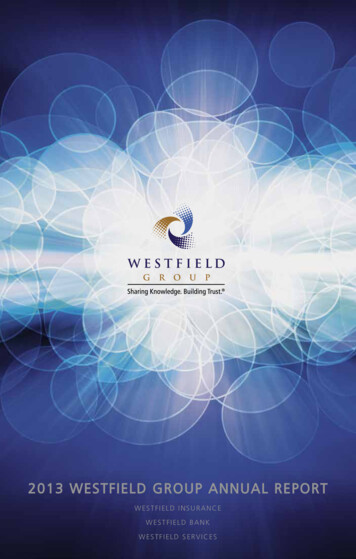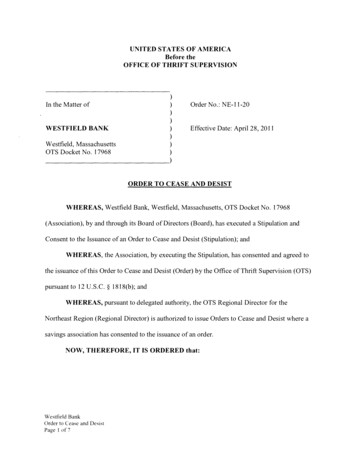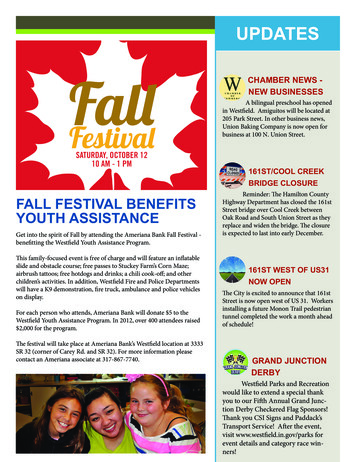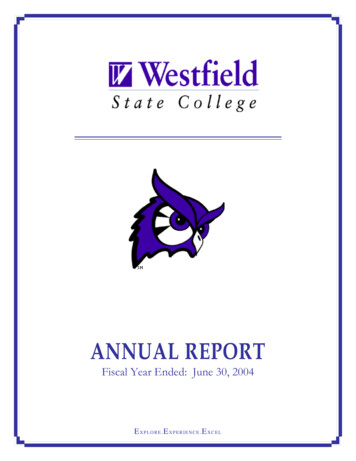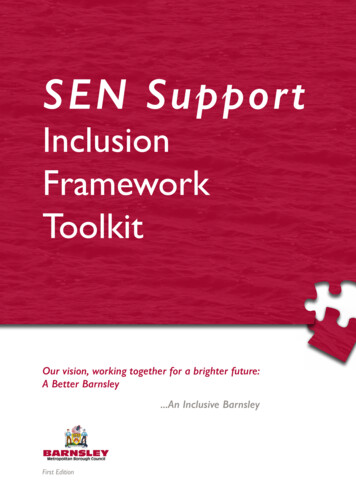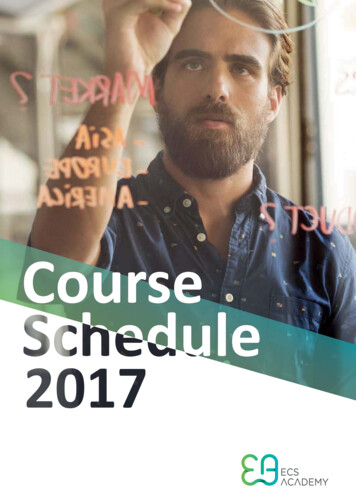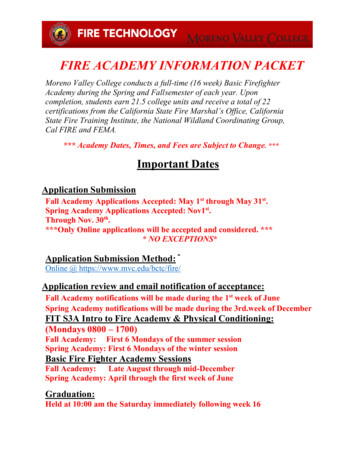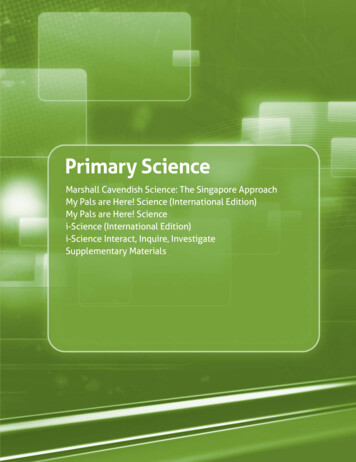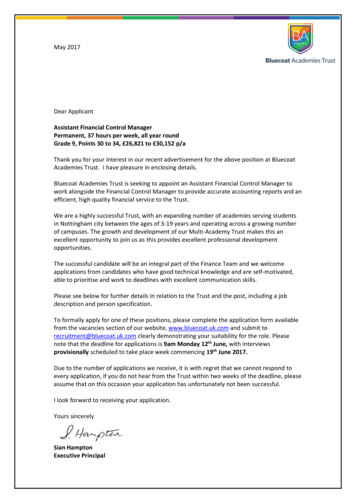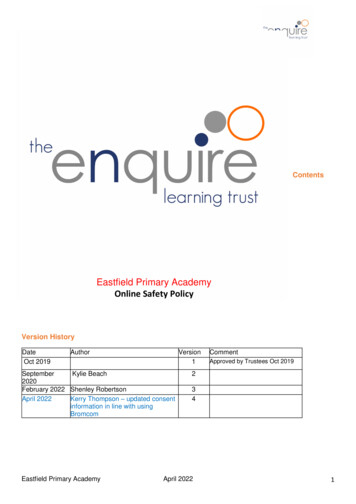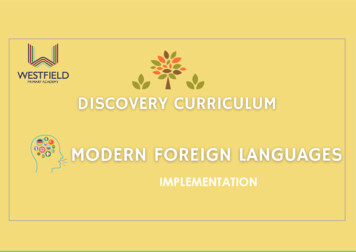
Transcription
IMPLEMENTATION
In the EYFS, childrenlearn about differentcultures and theirfoods. Here thechildren are frenchpastries and hotchocolate to findout about breakfastin France.IMPLEMENTATION
Modern Foreign Languages - ImplementationModular Approach – KnowledgeAt Westfield Primary Academy, French is taught across each year group in KS2 in modules that enable pupils to study a newtopic over several consecutive days. In years 3, children learn French in each of the autumn and spring half-terms with onefinal block in the summer term. In years 4 and 5, children learn French in both autumn half-terms and then complete onefurther block of learning in both the spring and summer terms. In year 6, children learn a block of French in each term.Each module follows a programme from Kapow, with including EYFS, to ensure better cognition and retention. Eachmodule is carefully sequenced to enable pupils to purposefully layer learning from previous sessions to facilitate theacquisition and retention of key scientific knowledge. Each module is revisited either later in the year or in the following yearas part of a spaced retrieval practice method to ensure pupils retain key knowledge and information.PlanningIn KS2, each module has a series of lesson plans which cover the required content and are divided into five key elements:listening, speaking, reading, grammar, writing and intercultural understanding. The modules are designed to be covered in 5lessons of approximately 50 minutes. Teachers use their judgement about whether to teach over 5 consecutive days, orwhether to combine lessons to teach in longer blocks over fewer days.All modules have a sequenced overview outlining the recommended number of sessions, key concepts, knowledge andvocabulary to be taught. Teachers are provided with a lesson plan to reduce workload and they annotate the plans tosupport the needs of their learners. The lesson plan covers the key learning, the vocabulary needed, the resources toprovide and the expected outcomes. The online lesson also provides a presentation for the smartboard, which includes keyvocabulary, grammar points and buttons to click to hear a French-speaker pronouncing the word.Additionally, each lesson provides the teacher with an online video recording to support and coach with correctpronunciation and key grammar points to be taught in order to prepare for the lesson. The subject leader is happy to discussfurther knowledge and teaching questions.From Autumn 2020, French has been recorded in subject specific workbooks, with a front sheet to introduce the topic andknowledge notes to accompany each lesson, including key vocabulary, grammar points and modelled sentences tosupport learning. Further writing frames and vocabulary resources are available on the Kapow website for each lesson.
Modern Foreign Languages - ImplementationKnowledge Organisers and Knowledge NotesKnowledge Organisers support each unit and we are currently developing Knowledge Notes for each session. TheKnowledge Organisers contain the key vocabulary, information and concepts pupils are expected to understand and retain.Knowledge Notes support vocabulary and concept acquisition through a well-structured sequence that is cumulative.Knowledge Notes are referenced throughout each module and copies are included in pupils’ workbooks along with theTGBA for that lesson.Example of a Knowledge Notefor Year 3 In the ClassroomExample of a Year 5 lesson planExample of a Year 6 front sheet
French – Learning StrandsListeningFrom the beginning of the French programme in year 3, children are taught active listening skills, learning to distinguish thedifferent sounds and patterns of a foreign language. The children build their ability from listening to single words and sounds,to beginning to distinguish detail in an unfamiliar story.Speaking / OracyThroughout the languages curriculum, children are given rich opportunities to rehearse using French to discuss their views,opinions and wider lives. They are given the opportunity to engage in purposeful conversations, for example, buying tickets ordescribing their homes and families, as well as using language to tell, instruct and gain information. Spoken languageactivities and practice underpin each activity in the French curriculum and provide children with the confidence to expressthemselves in another language from their mother tongue.VocabularyVocabulary forms a key part of our wider curriculum and in French is taught discretely in every lesson. Children begin to builda bank of vocabulary throughout their journey through KS2, allowing them to develop more detailed responses anddescriptions in their French language work. ‘Vital Vocabulary’ is taught and applied, both verbally and in writing, in everyFrench lesson.An example of avocabulary bank withnew words taught in aYear 5 lessonChildren in Year 3learning to sing aChristmas song inFrench.
ReadingChildren begin to read familiar songs and rhymes in French, learning to spot correlations between words in English andFrench, building to beginning to recognise different parts of speech and verb endings by the end of KS2. The begin to buildtheir confidence in reading authentic French documents for pleasure and to gain new knowledge.WritingBeginning with simple labels and phrases, children develop their ability to write in French, finishing the end of KS2 with shortwritten passages, for example, describing their house.GrammarDiscrete grammar teaching occurs in every French lesson, in a manner which supports the activity the children arecompleting. Teachers make links to grammar in the children’s English curriculum and point out similarities and differences inorder to help with understanding.Intercultural UnderstandingThroughout the French curriculum, teachers endeavour to make links to the wider world community, through celebratingevents such as Christmas and national holidays, locating other French speaking countries, planning a visit to France in lessonsand studying some of the great art works of Matisse. Children in Year 6 will also be able to run a French cafe in the summerand invite children from other years to taste French food.ResourcesAll French modules are underpinned by high quality resources, which engage and stimulate children’s curiosity whilst ensuringkey skills are learnt.
Continuous Professional DevelopmentTeachers are encouraged to develop their subject knowledge by accessing resources in school and online including theteacher preparation videos provided by Kapow. The subject leader conducts an annual skills audit in order to see what furthertraining is needed and to monitor the use of the materials provided.All staff have undergone CPD in Cognitive Load Theory, Spaced Practice Retrieval Theory and planning the wider curriculumwhich has supported the development of a modular wider curriculum.In addition, staff have been trained in the Theory of Reading which emphasises the importance of teaching reading across allsubjects and how to teach vocabulary – including etymology and morphology.
At Westfield Primary Academy, French is taught across each year group in KS2 in modules that enable pupils to study a new topic over several consecutive days. In years 3, children learn French in each of the autumn and spring half-terms with one final block in the summer term. In years 4 and 5, children learn French in both autumn half-terms and then complete one further block of learning in .
